Rise of Wisdom Pedagogy Research in Higher Education (1980–2022): A Systematic Literature Review
Abstract
1. Introduction
2. Method
2.1. Research Design
2.2. Research Philosophy and Approach
2.3. Criteria of Database Selection and Data Screening
2.4. Methods of Data Collection and Analysis
3. Results and Discussion
3.1. Data Collection and Screening
3.2. Data Analysis of Publications in Higher Education
3.3. Systematic Literature Review
3.3.1. Evolution of Wisdom and Wisdom Pedagogy Publications in Higher Education
3.3.2. Evolution of Wisdom Pedagogy Articles in Higher Education
3.3.3. Keywords and Abstracts Analysis
- The themes ‘sustainability’ and ecological thinking were mentioned in several articles [43,51,53,54,56,57]. ‘Spirituality’ and ‘religious education’ were emerging themes too [42,45,49,52,58,59]. Themes of ‘whole self’, ‘self-cultivation’, ‘self-knowledge’, ‘character building’, ‘character development’, ‘professional development’, ‘key competences’, and ‘well-being’ emerged from seven articles [45,47,48,50,51,53,59].
3.3.4. Bipartite Network Analysis
3.4. Summary
- Since the 1980s wisdom research gained momentum in psychology, leadership, human resource, management but there has not been enough attention paid on how wisdom can be cultivated (pedagogy) in persons in higher education [2].
- The data collection and screening (Figure 2) of total 420,778 publications in higher education detected 409,551 for the period of 1980–2022. Further screening resulted in 524 wisdom, 33 wisdom pedagogy publications (among them only 24 articles) in WoS database. The identified 24 articles were analyzed with SLR.
- This study identified five evolutionary phases of wisdom (Figure 5), wisdom pedagogy publications (Figure 6), and articles (Figure 7) in higher education during the 1980–2022 period such as ‘No publication’, ‘Initiation’, Slow growth’, ‘Steady growth’, and ‘Intensive growth’. Though wisdom research in higher education is about two decades late compared to other disciplines, it is gaining a momentum, and it shows an exponential growth since 2003.
- The SLR of 24 wisdom pedagogy articles during the 2003–2022 period (Table A1 and Table A2 in Appendix A) surprisingly resulted only 2 articles [2,14] directly discussing ‘wisdom pedagogy’. This finding indicates that, while wisdom research is rising in higher education, there are not enough articles published in wisdom pedagogy.
4. Conclusions
Funding
Institutional Review Board Statement
Informed Consent Statement
Data Availability Statement
Conflicts of Interest
Appendix A
| Wisdom Pedagogy Evolution Period | Keywords/Reference |
|---|---|
| Initiation (2003–2013) | decolonization, globalization, indigenous worldviews, pedagogy, Pacific education, Pacific Islands studies [62] |
| religious education, pedagogy, wisdom, friendship, co-creation, dialogue [42] | |
| anthropology, pedagogy, wisdom, responsibility, authority and determinism, nature and spirit [43] | |
| higher education, wisdom, early childhood, teacher education, pedagogy, spirituality, immigrant [44] | |
| Slow growth (2014–2017) | embodiment, eroticism, gender, sexuality, university, academic work |
| sustainability pedagogy, higher education, ecological problems [63] ecological systems, indigenous teaching, whole self, transformational learning [51] | |
| catholic higher education, agrarianism, Catholicism, culture [52] | |
| British values, countering extremism, religious literacy, equalities, multiculturalism, Islamophobia [58] | |
| higher education, learning design, skill sets, pedagogy, curriculum, key competences, sustainability, university, thinking [53] | |
| ethical leadership, cultivating practical wisdom, adult education, leading change, academic life, leadership pedagogy [46] | |
| Intensive growth (2018–2022) | wisdom, wisdom curriculum, wisdom pedagogy [14] |
| spirituality, wisdom sharing, curriculum development, cross-cultural values, transcendent level, non-religious [49] | |
| Taoism, Tao Te Ching, self-awareness, individuality, diversity, self-cultivation [59] | |
| higher education, ecozoic era, justice, sustainability, pluriverse, interdependence, relationality, ecological economics, research agenda, textbooks [54] | |
| student engagement, higher education, professional development, forward-facing curriculum, peripheral wisdom, collaborative learning [50] | |
| authoritarian resilience, civil society, cultural governance, educated acquiescence, higher education, intellectuals [55] | |
| wisdom, pedagogy, university, worldly wisdom, learning and teaching modalities, wisdom pedagogy, domains of knowledge, balance pedagogies [2] | |
| mindfulness, holistic learning, self-knowledge, self-awareness, well-being, compassion, wisdom, cultural-spiritual perspective, transformative learning, life-long learning, higher education, contemplative pedagogy [45] | |
| kindergarten teacher quality, scale development, teacher quality, teacher professionalism, cultural existentialism pedagogy, children, empowerment, education, climate, world [56] | |
| context sensitive curricula, pedagogical strategies, South African curriculum, Western worldview [60] | |
| soil science, teaching and learning, pedagogical practices, inquiry-based learning, scaffolding in course levels [57] | |
| character development, character building, character education, online education, practical wisdom, virtue ethics, cultivation of character, cultivation of wisdom [47] | |
| social class, widening participation, upwards mobility, academic habitus, navigational capital, working-class academics [61] | |
| character education, phronesis, practical wisdom, eudaemonia, well-being, moral philosophy, applied ethics, sport pedagogy [48] |
| Wisdom Pedagogy Evolution Period | Reference | Topic | Method and Context | Findings and Recommendation |
| Initiation (2003–2013) | [62] | the impact of colonialism on people’s minds challenge the dominance of western philosophy, content, and pedagogy | Oceania, indigenous people | curricula should include:
|
| [42] | Religious education | Reflections of religious educators in a movie | friendship, the journey, risk-taking, awakening, turning points, and the choice to keep going friendship and co-creating dialogue | |
| [43] | Molavi’s anthropological pedagogy wisdom responsibility determinism and authority nature spirit | Applied research Interviews high and primary schools’ education in Iran | shift educational settings from external knowledge transfer to knowledge production (creativity). | |
| [44] | Learning and whole-being | ancient and modern approaches to gaining wisdom and wellness contemplative methods, such as meditation, qigong, yoga, arts, and dance | learning is much more than just accumulating knowledge and skills Learning includes knowing ourselves-mind, body, and spirit compassion, care address students’ individual needs address the society’s needs Higher education must contribute to a better world Wisdom is what guides students to be whole, true to themselves while learning balance in students’ lives and enhance their ability to be reflective and transformative | |
| Slow growth (2014–2017) | [63] | what are we to do with ourselves? erotic, pleasure and love in higher education | feminist theorists Universities have always been environments where a love of learning and pleasure in pedagogy is possible. academic work as embodied practice, involving pleasure and love. | cultural and societal factors have rendered academic life and commodified and sexualized academic life stripped out the opportunities to love and enjoy academic life reclaiming eroticism and the erotic, eros in the academy relationship between bodies and knowledge recognizing love in learning and wisdom; and cultivating the pleasure and nurturance that arise in collegial and pedagogic relations |
| [51] | Address cultural and ecological problems Ecological systems | Higher education Teaching and learning sustainability Sustainability pedagogy indigenous teachings about the whole self transformational learning | transformational sustainability learning is thematic and cocreated, critically questions dominant norms and incorporates diverse perspectives, is active, participatory and relational, and is grounded in a specific place | |
| [52] | Agricultural challenges intergenerational transmission of agricultural knowledge | Catholic pedagogy Agriculture in the United States Catholic colleges and universities | need a new culture new way of understanding and enacting our relationship to the land and the production of food interdisciplinary search for wisdom respect for manual work education of the whole person cultivation of the virtue of humility, and the enrichment of Catholic practice and culture | |
| [58] | British education Fundamental British values | counter-terrorism and security legislation citizenship education, history teaching, religious education, and spiritual, moral, social, and cultural (SMSC) development | Need for critical, corrective, and restorative work Dialogue greater respect greater trust and cooperation greater attention to Islamic values, wisdom, and pedagogy | |
| [53] | Need for work-ready graduates Become lifelong learners | Course design industry-linked curriculum learning-focused approaches universities and colleges | framework to capture the ‘lived experience’ and practice wisdom of educational design good practice in curriculum and pedagogy use of this framework will build the confidence in the contemporary world. | |
| [46] | Ethical Leadership wisdom and failure in leadership | leadership pedagogy Aristotelian framework in cultivating theoretical and practical wisdom among adult learners Advanced Learning and Leadership program at the University of Melbourne Doctoral education | principles and values in achieving ethical leadership envisage more ethical ways of leadership | |
| Intensive growth (2018–2022) | [14] | foster wisdom in students theories of wisdom education | short-term longitudinal quantitative study traditional higher education setting wisdom curriculum 131 students in five courses 176 students in seven courses | this is the first time that a wisdom curriculum has been demonstrated to increase wisdom in a traditional higher education setting |
| [49] | need arises for an appreciation and understanding of our common humanity | interreligious approach curriculum development | approach incorporates a pedagogy which explicitly recognizes the transcendent or spiritual aspects of human experience outside of a religious framework critical framework of spirituality, wisdom, and wisdom sharing allows for student growth in cross-cultural values, such as mutuality, compassion, empathy, and justice increased awareness of religious and non-religious wisdom traditions promote individual and communal well-being | |
| [59] | the future of higher education education model has not attached sufficient importance to individuality Student’s unique talents are mostly neglected personality and creativity are not given due consideration in the teaching process | individualized teaching and learning eastern perspective | Taoist wisdom of individuality, pluralism, and diversity has great philosophical value and practical revelation to the modern education university should not be an industrial factory, but a nurturing garden where students’ nature as humans are understood and their individual differences are respected | |
| [54] | planet’s socio-ecological crises redirect education toward teaching how to create conditions for all life to thrive | Analysis of university textbooks in economics, law, and natural sciences North American universities students and activists within the academic system co-constructing knowledge and wisdom | propose paradigm shifts, shifts in the ologies:
biophysicality embedded relationality, pluralism, sustainable well-being of all | |
| [50] | business transformation | Case study peripheral wisdom (learning, meaning, and identity undergraduate fashion programme in a UK University Fashion business retail sector higher education sector | engage students to suitably prepare them for future professional practice collaborative, forward-facing pedagogy shift from traditional lectures to collaborative learning practices | |
| [55] | critical intelligentsia fundamental change to Chinese politics and pedagogy | China university is often regarded as both the bedrock and beneficiary of liberal democracy | the contributions of a cooperative academy to authoritarian durability | |
| [2] | pedagogical approaches to develop wisdom how teachers across diverse locations throughout history have learned to develop wisdom and how they have educated others to such understandings universities have forgotten how to develop wisdom forgetting the pedagogical pathway to do so | critical, interpretivist, qualitative research methods to examine archival and archaeological evidence and conduct cross-cultural and often comparative and international case studies to study wisdom history of pedagogies modern university | how and if universities might cultivate essential elements of wisdom reconnect to time-honoured pedagogies for teaching and learning wisdom | |
| [45] | how students experienced and made meaning of a novel academic course in mindfulness | interpretive phenomenological analysis critical reflective journals and semi-structured interviews Moroccan University | foster holistic learning through self-knowledge develop deeper self-awareness, greater well-being, compassion, and wisdom and to experience profound transformation connections with students’ religious and spiritual practices transformative and lifelong learning build contemplative pedagogy into the core curriculum | |
| [56] | develop and validate quality scale of Chinese Kindergarten Teacher, K-12 Teachers | factor analyses descriptive statistics profile analyses hierarchical regression analyses surveyed 1834 teachers from Shanghai kindergartens | healthy condition, practical wisdom, cultural literacy, empowerment and autonomy, and loyalty and commitment good quality, ranking highly in practical wisdom | |
| [60] | decolonization of the school curriculum is required pedagogical strategies have not been clearly described | in-depth qualitative study In-depth interviews thematically analyzed interpretivist, multi-site ethnographic, qualitative approach Science education curricula in Africa Indigenous Knowledge System (IKS) Zulu cultural group | Focus on African worldview and an integration of the local context and community culturally specific pedagogical model:
| |
| [57] | Pedagogical strategy:
| online questionnaire peer-assessment interactive problem-based learning environment contest geoscience students final year students majoring in Soil Sciences, a BSc program at Sultan Qaboos University, Oman | Improvements in interpersonal metacognitive skills: self-reported improvements in problem-solving abilities, thinking out of the box, observation, teamwork, capacity to perform under pressure, and communication | |
| [47] | Character education how to develop students’ character and especially practical wisdom much needed in later professional life | constructivist learning neo-Aristotelian virtue ethics Online higher education E-learning, digital media | Online education must pay more explicit attention to the cultivation of character and wisdom in their teaching cultivate character through online education | |
| [61] | What are the advantages of being an upwardly mobile academic? | narrative, phenomenological approach 25 narrative interviews biographical narrative interpretive method (BNIM) literature on the cultural mismatch and cleft habitus in the academic context working-class academics | “navigational capital”, “revolutionary potential”, “wisdom” and a distinct “working-class pedagogy” upwardly mobile academic can help make higher education more inclusive and sustainable | |
| [48] | higher education curriculums remain misunderstood, understudied and underdeveloped urgent need to acknowledge, problematize, interpret and to study the unavoidably philosophical nature of the physical education | neo-Aristotelian interpretation of physical education neo-Aristotelian virtue ethics character education | lack of emphasis on wisdom and eudaemonia cultivation of virtuous skills, agency, and reasoning are foundational to a flourishing society |
References
- World Economic Forum. The Global Risks Report 2024. Insight Report. 19th Edition. Geneva: World Economic Forum 2023. Available online: https://www.weforum.org/reports/global-risks-report-2024 (accessed on 10 March 2024).
- Diamond, Z.M. Old Pedagogies for Wise Education: A Janussian Reflection on Universities. Philosophies 2021, 6, 64. [Google Scholar] [CrossRef]
- Jakubik, M. The Role of Higher Education in Solving Global Problems. Int. J. Manag. Knowl. Learn. 2022, 11, 285–295. [Google Scholar] [CrossRef]
- Karami, S.; Parra-Martinez, F.A. Foolishness of COVID-19: Applying the Polyhedron Model of Wisdom to Understand Behaviors in a Time of Crisis. Roeper Rev. 2021, 43, 42–52. [Google Scholar] [CrossRef]
- Ling, L. Universities and research in times of crisis: The getting of wisdom. Qual. Res. J. 2020, 20, 361–371. [Google Scholar] [CrossRef]
- Maxwell, N. Creating a Better World. Towards the University of Wisdom. In The Future University. Ideas and Possibilities; Barnett, R., Ed.; Routledge: New York, NY, USA, 2012; Chapter 10; pp. 123–138. [Google Scholar]
- Maxwell, N. How Universities Can Help Create a Wiser World: The Urgent Need for an Academic Revolution; Imprint Academic: Exeter, UK, 2014. [Google Scholar]
- Maxwell, N. From Knowledge to Wisdom. In Briefs in Philosophy; Springer: Berlin/Heidelberg, Germany, 2019; pp. 69–77. [Google Scholar]
- Maxwell, N. How Wisdom Can Help Solve Global Problems. In Applying Wisdom to Contemporary World Problems; Sternberg, R., Nusbaum, H., Glueck, J., Eds.; Palgrave Macmillan: London, UK, 2019; pp. 337–380. [Google Scholar]
- Maxwell, N. The World Crisis–and What to Do about It: A Revolution for Thought and Action; World Scientific Publishing Company: London, UK, 2021. [Google Scholar]
- Maxwell, N. Universities Have Betrayed Reason and Humanity—And What’s to Be Done About It. Front. Sustain. 2021, 2, 631631. [Google Scholar] [CrossRef]
- Russell, B. Knowledge and Wisdom. In Portraits from Memory and Other Essays; Russell, B., Ed.; Simon and Schuster: Newy York, NY, USA, 1956; pp. 173–177. Available online: https://archive.org/details/portraitsfrommem005918mbp/page/n177/mode/2up?view=theater&q=wisdom (accessed on 29 April 2023).
- Ardelt, M. Wisdom as expert knowledge system: A critical review of a contemporary operationalization of an ancient concept. Hum. Dev. 2004, 47, 257–285. [Google Scholar] [CrossRef]
- Bruya, B.; Ardelt, M. Wisdom can be taught. A proof-of-concept study for fostering wisdom in the classroom. Learn. Instr. 2018, 58, 106–114. [Google Scholar] [CrossRef]
- Baltes, P.B.; Staudinger, U.M. Wisdom. A metaheuristic (pragmatic) to orchestrate mind and virtue toward excellence. Am. Psychol. 2000, 55, 122–136. [Google Scholar] [CrossRef]
- Bangen, K.J.; Meeks, T.W.; Jeste, D.V. Defining and Assessing Wisdom: A Review of the Literature. Am. J. Geriatr. Psychiatry 2013, 21, 1254–1266. [Google Scholar] [CrossRef]
- Jeste, D.V.; Ardelt, M.; Blazer, D.; Kraemer, H.C.; Vaillant, G.; Meeks, T.W. Expert consensus on characteristics of wisdom: A Delphi method study. Gerontologist 2010, 50, 668–680. [Google Scholar] [CrossRef]
- Karami, S.; Ghahremani, M.; Parra-Martinez, F.A.; Gentry, M. A polyhedron model of wisdom: A systematic review of the wisdom studies in psychology, management and leadership, and education. Roeper Rev. 2020, 42, 241–257. [Google Scholar] [CrossRef]
- Sternberg, R.J.; Karami, S. What is Wisdom? A Unified 6P Framework. Rev. Gen. Psychol. 2021, 25, 134–151. [Google Scholar] [CrossRef]
- Bachmann, C.; Habisch, A.; Dierksmeier, C. Practical Wisdom: Management’s No Longer Forgotten Virtue. J. Bus. Ethics 2018, 153, 147–165. [Google Scholar] [CrossRef]
- Banerjee, A.; Knowledge and Wisdom Management. Google Scholar 2014. Available online: http://www.delhibusinessreview.org/v_2n2/dbrv2n2p.pdf (accessed on 25 May 2021).
- Ekmekҫi, A.K.; Teraman, S.B.S.; Acar, P. Wisdom and management: A conceptual study on wisdom management, 10th international strategic management. Procedia—Soc. Behav. Sci. 2014, 150, 1199–1204. [Google Scholar] [CrossRef]
- Jakubik, M. How can practical wisdom manifest itself in five fundamental management and leadership practices? Vilakshan-XIMB J. Manag. Emerald Insight 2021, 18, 3–25. [Google Scholar] [CrossRef]
- Jakubik, M.; Müürsepp, P. From knowledge to wisdom. Will Wisdom Management replace Knowledge Management? Eur. J. Manag. Bus. Econ. (EJM&BE) 2022, 31, 367–389. [Google Scholar] [CrossRef]
- McKenna, B.; Rooney, D. Wisdom Management: Tension between Theory and Practice in Practice. 2005. Available online: https://www.researchgate.net/publication/37618441_Wisdom_Management_Tensions_Between_Theory_And_Practice_In_Practice (accessed on 31 May 2023).
- McKenna, B.; Rooney, D.; Boal, K.B. Wisdom principles as a meta-theoretical basis for evaluating leadership. Leadersh. Q. 2009, 20, 177–190. [Google Scholar] [CrossRef]
- Nonaka, I.; Chia, R.; Holt, R.; Peltokorpi, V. Wisdom, management and organization. Manag. Learn. 2014, 45, 365–376. [Google Scholar] [CrossRef]
- Rooney, D.; McKenna, B.; Liesch, P. Wisdom and Management in the Knowledge Economy; Routledge: New York, NY, USA, 2010. [Google Scholar] [CrossRef]
- Solé, J.B. Wisdom Management: ECKM 2007–2017 Review. In Proceedings of the 18th European Conference on Knowledge Management (ECKM), Barcelona, Spain, 7–8 September 2017; Volume 1, p. 55. Available online: https://books.google.fi/books?hl5en&lr5&id59k88DwAAQBAJ&oi5fnd&pg5PA55&dq5%22wisdomþmanagement%22þsource:%22KnowledgeþManagement%22&ots5slzxV9WtFB&sig54lXUNA1WaRhG6vEhXz4A4yoFK3M&redir_esc5y#v5onepage&q&f5false (accessed on 23 May 2023).
- Barnett, R. Being a University; Routledge, Foundations and Futures of Education Series; Taylor & Francis Group: London, UK, 2011. [Google Scholar]
- Barnett, R. Thinking and Rethinking of University: The selected works of Ronald Barnett; World Library of Educationalists, Routledge, Taylor & Francis Group: New York, NY, USA, 2015. [Google Scholar]
- Barnett, R. The Ecological University: A Feasible Utopia; Routledge, Taylor & Francis Group: New York, NY, USA, 2018; Chapter 8, Sightings of an ecological curriculum; pp. 113–125. [Google Scholar]
- Barnett, R. The Philosophy of Higher Education. A Critical Introduction; Routledge Taylor & Francis Group: London, UK, 2022. [Google Scholar]
- Jakubik, M. Searching for Practical Wisdom in Higher Education with Logos, Pathos and Ethos. Case: Finnish Universities of Sciences. Invited paper to the Special Issue ‘From the Acquisition of Knowledge to the Promotion of Wisdom’. Philosophies 2021, 6, 63. [Google Scholar] [CrossRef]
- Müürsepp, P. Making Sense of Wisdom Management. Int. J. Appl. Inf. Manag. 2021, 1, 63–69. [Google Scholar] [CrossRef]
- Robinson, D.N. Wisdom through the ages. In Wisdom: Its Nature, Origins, and Development; Sternberg, R.J., Ed.; Cambridge University Press: Cambridge, UK, 1990. [Google Scholar]
- Nelimarkka, M. Computational Thinking and Social Science: Combining Programming, Methodologies and Fundamental Concepts; SAGE Publications Ltd.: London, UK, 2023. [Google Scholar]
- Lame, G. Systematic Literature Reviews: An Introduction. In Proceedings of the 22nd International Conference on Engineering Design (ICED19), Delft, The Netherlands, 5–8 August 2019. [Google Scholar]
- Egger, M.; Smith, G.D.; Altman, D.G. (Eds.) Systematic Reviews in Health Care: Meta-Analysis in Context, 2nd ed.; BMJ Books: London, UK, 2008. [Google Scholar]
- Alexander, P.A. Methodological Guidance Paper: The Art and Science of Quality Systematic Reviews. Rev. Educ. Res. 2020, 90, 6–23. [Google Scholar] [CrossRef]
- Rethlefsen, M.L.; Kirtley, S.; Waffenschmidt, S.; Ayala, A.P.; Moher, D.; Page, M.J.; Koffel, J.B. PRISMA-S: An extension to the PRISMA Statement for Reporting Literature Searches in Systematic Reviews. Med. Libr. Assoc. 2021, 109, 174–200. [Google Scholar]
- Meyers, P.; Willhauck, S. Thelma and Louise do religious education: A dialogue from the edge for leading with hope. Relig. Educ. 2003, 98, 382–398. [Google Scholar] [CrossRef]
- Naraghi, M.S.; Kahnooji, M.; Shariatmadari, A.; Naderi, E. Molavi’s anthropological pedagogic orientations in order to improve objectives of high and primary schools’ education in Iran. Life Sci. J.—Acta Zhengzhou Univ. Overseas Ed. 2012, 9, 2813–2821. [Google Scholar]
- Smith, C.; Ritchie, J. Enacting Indigenous Wisdom within Higher Education Pedagogies: An Example from Early Childhood Teacher Education in Aotearoa. In Re-Envisioning Higher Education: Embodied Pathways to Wisdom and Social Transformation; Lin, J., Oxford, R.L., Brantmeier, E.J., Eds.; Book Series: Transforming Education for the Future; Information Age Publishing Incorporated: Charlotte, NC, USA, 2013; pp. 143–160. [Google Scholar]
- Kumar, S. Mindfulness in a Moroccan University: Exploring Students’ Transformational Journey Through an Academic Course in Mindfulness. J. Transform. Educ. 2021, 19, 241–260. [Google Scholar] [CrossRef]
- Janfada, M. Enriching Ethical Leadership in Higher Education as Advanced Learning. J. Leadersh. Stud. 2017, 11, 57–59. [Google Scholar] [CrossRef]
- Harrison, T.; Laco, D. Where’s the character education in online higher education? Constructivism, virtue ethics and roles of online educators. E-Learn. Digit. Media 2022, 19, 555–573. [Google Scholar] [CrossRef]
- Brundson, J.J. Toward the virtuous mover: A neo-Aristotelian interpretation of physical education. Phys. Educ. Sport Pedagog. 2022. early access. [Google Scholar]
- Gordon, E.S. Critical Engagement: Integrating Spirituality and “Wisdom Sharing” into Higher Education Curriculum Development. In Interreligous Pedagogy. Asian Christianity in the Diaspora; Park, J., Wu, E., Eds.; Palgrave Pivot: Cham, UK, 2018; pp. 89–105. [Google Scholar] [CrossRef]
- Conlon, J. How PLM Drives Innovation in the Curriculum and Pedagogy of Fashion Business Education: A Case Study of a UK Undergraduate Programme. Prod. Lifecycle Manag. 2019, 4, 171–183. [Google Scholar]
- Burns, H.L. Transformative Sustainability Pedagogy: Learning from Ecological Systems and Indigenous Wisdom. J. Transform. Educ. 2015, 13, 259–276. [Google Scholar] [CrossRef]
- Groppe, E. Seed That Falls on Fertile Ground (Matthew 13:1-9): Catholic Higher Education and the Renewal of Agrarianism. Horizons 2015, 42, 38–69. [Google Scholar] [CrossRef]
- Holdsworth, S.; Hegarty, K. From praxis to delivery: A Higher Education Learning Design Framework (HELD). J. Clean. Prod. 2016, 122, 176–185. [Google Scholar] [CrossRef]
- Roncancio, I.V.; Temper, L.; Sterlin, J.; Smolyar, N.L.; Sellers, S.; Moore, M.; Melgar-Melgar, R.; Larson, J.; Horner, C.; Erickson, J.D.; et al. From the Anthropocene to Mutual Thriving: An Agenda for Higher Education in the Ecozoic. Sustainability 2019, 11, 3312. [Google Scholar] [CrossRef]
- Perry, E.J. Educated acquiescence: How academia sustains authoritarianism in China. Theor. Soc. 2020, 49, 1–22. [Google Scholar] [CrossRef]
- Lan, S.F.; Jiang, Y.; Di, H.J.; Li, H.; Zhou, J.; Li, F. Development and validation of the Chinese kindergarten teacher quality scale in Shanghai. Child. Youth Serv. Rev. 2021, 131, 106272. [Google Scholar] [CrossRef]
- Al-Ismaily, S.; Al-Mayhai, A.; Al-Siyabi, B. Soil skills challenge: A problem-based field competition towards active learning for BSc. Geoscience students. Geoderma 2021, 385. early access. [Google Scholar] [CrossRef]
- Richardson, R. British values and British identity: Muddles, mixtures, and ways ahead. Lond. Rev. Educ. 2015, 13, 37–48. [Google Scholar] [CrossRef]
- Yang, F. Taoist wisdom on individualized teaching and learning-Reinterpretation through the perspective of Tao Te Ching. Educ. Philos. Theory 2019, 51, 117–127. [Google Scholar] [CrossRef]
- Opoku, M.J.; James, A. Pedagogical Model for Decolonising, Indigenising and Transforming Science Education Curricula: A Case of South Africa. J. Balt. Sci. Educ. 2021, 20, 93–107. [Google Scholar] [CrossRef]
- Luczaj, K. Social class as a blessing in disguise? Beyond the deficit model in working-class and higher education studies. Equal. Divers. Incl. 2023, 42, 193–209. [Google Scholar] [CrossRef]
- Thaman, K.H. Decolonizing Pacific studies: Indigenous perspectives, knowledge, and wisdom in higher education. Contemp. Pac. 2003, 15, 1–17. [Google Scholar] [CrossRef]
- Bell, E.; Sinclair, A. Reclaiming eroticism in the academy. Organization 2014, 21, 268–280. [Google Scholar] [CrossRef]
- Theasdale, G.R.; Ma Rhea, Z. (Eds.) Local Knowledge and Wisdom in Higher Education; Issues in Higher Education Series; Pergamon Elsevier: Kidlington, UK, 2000; Volume 14. [Google Scholar]
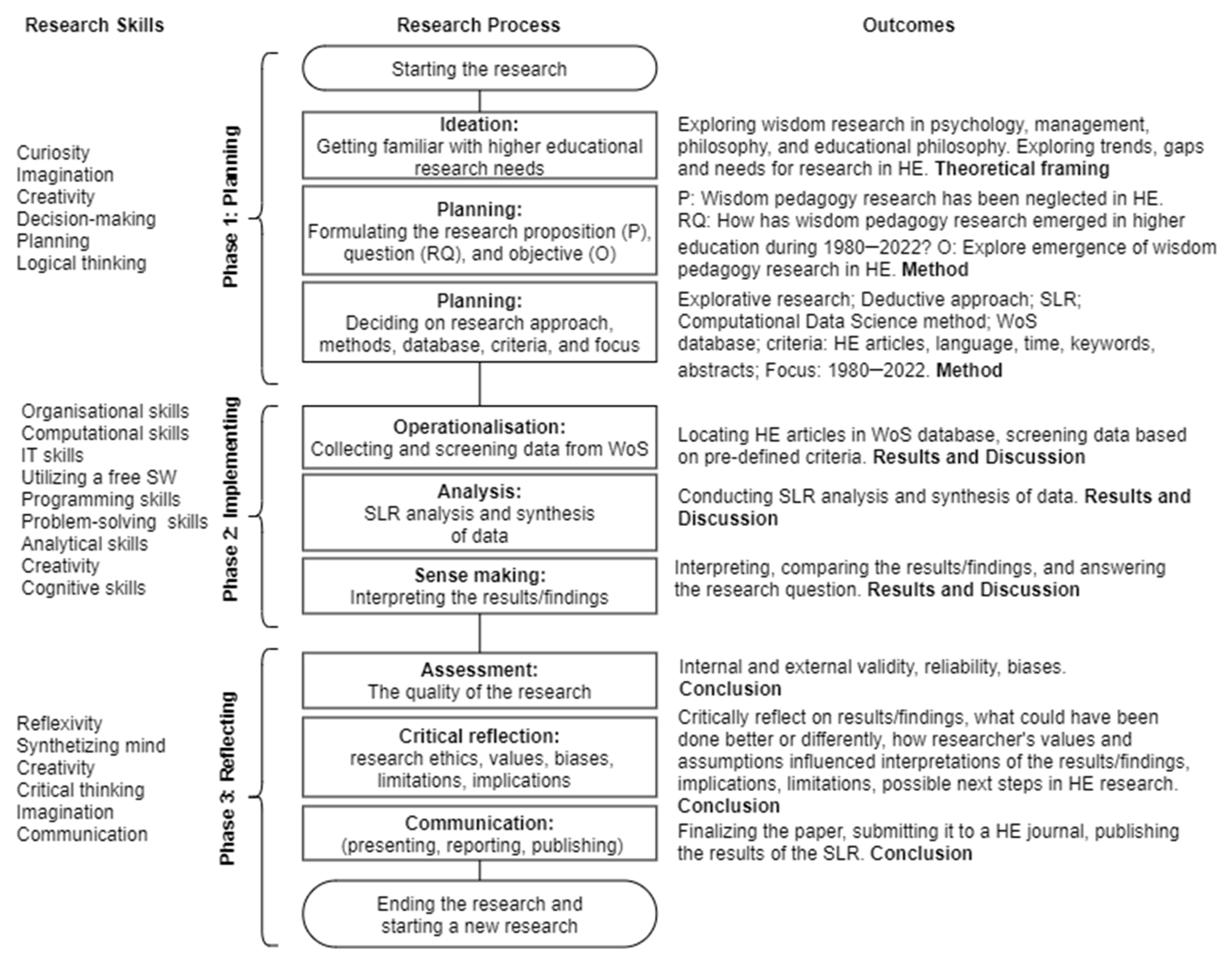

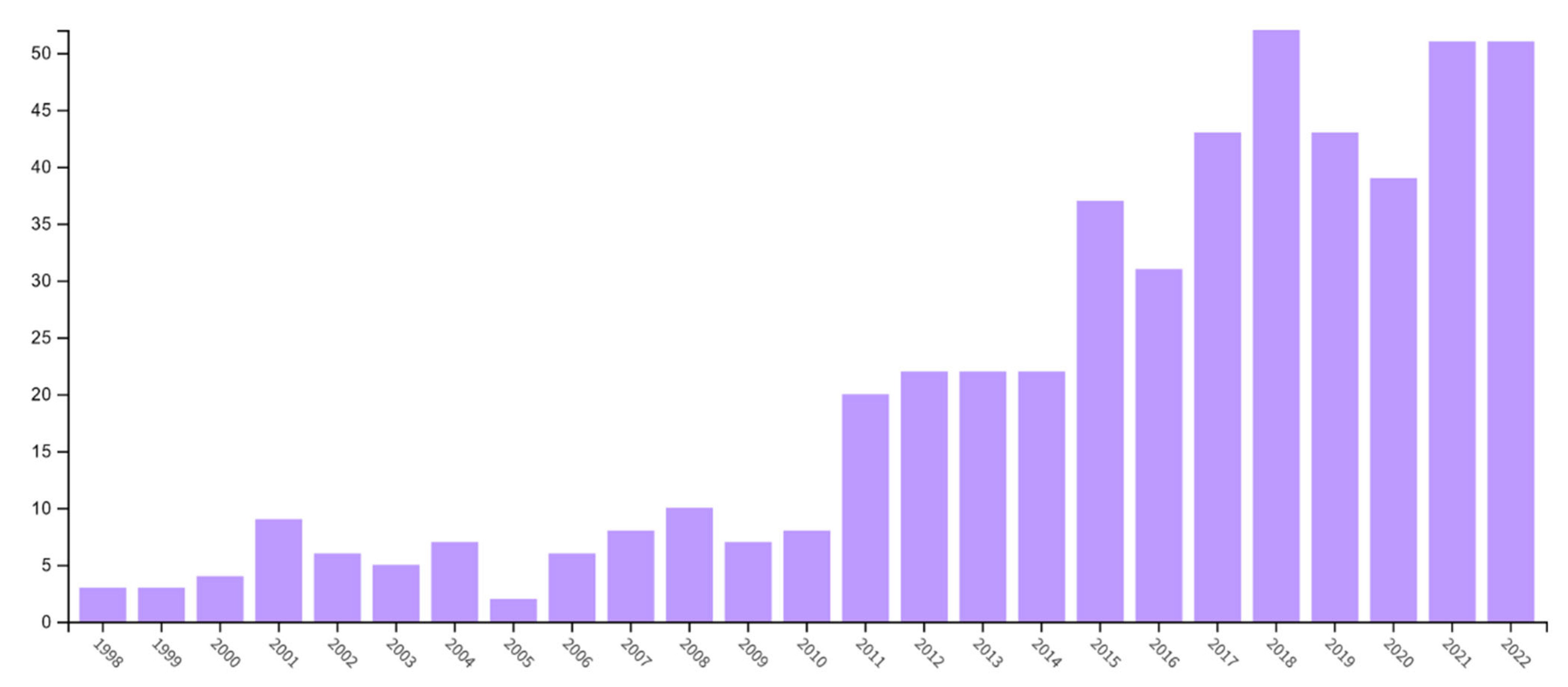
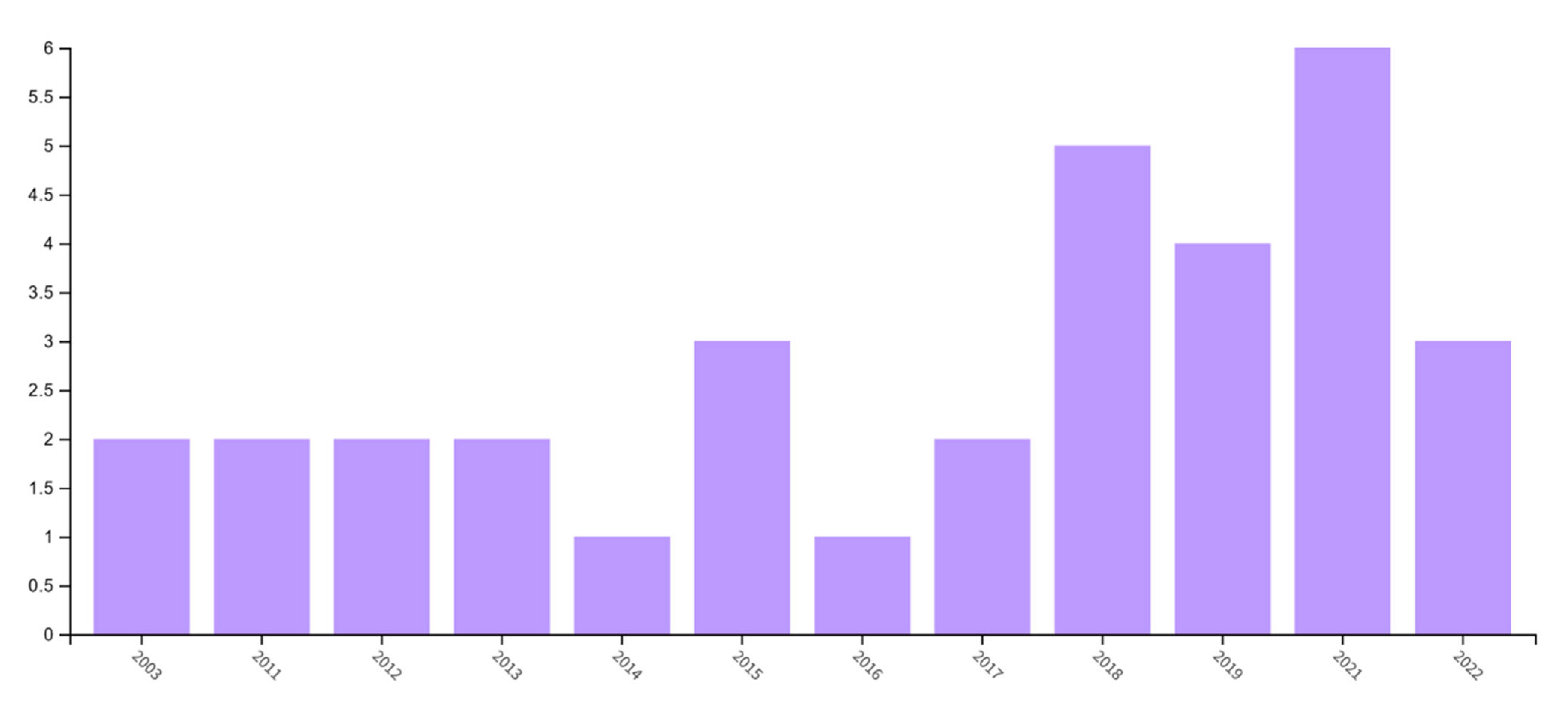

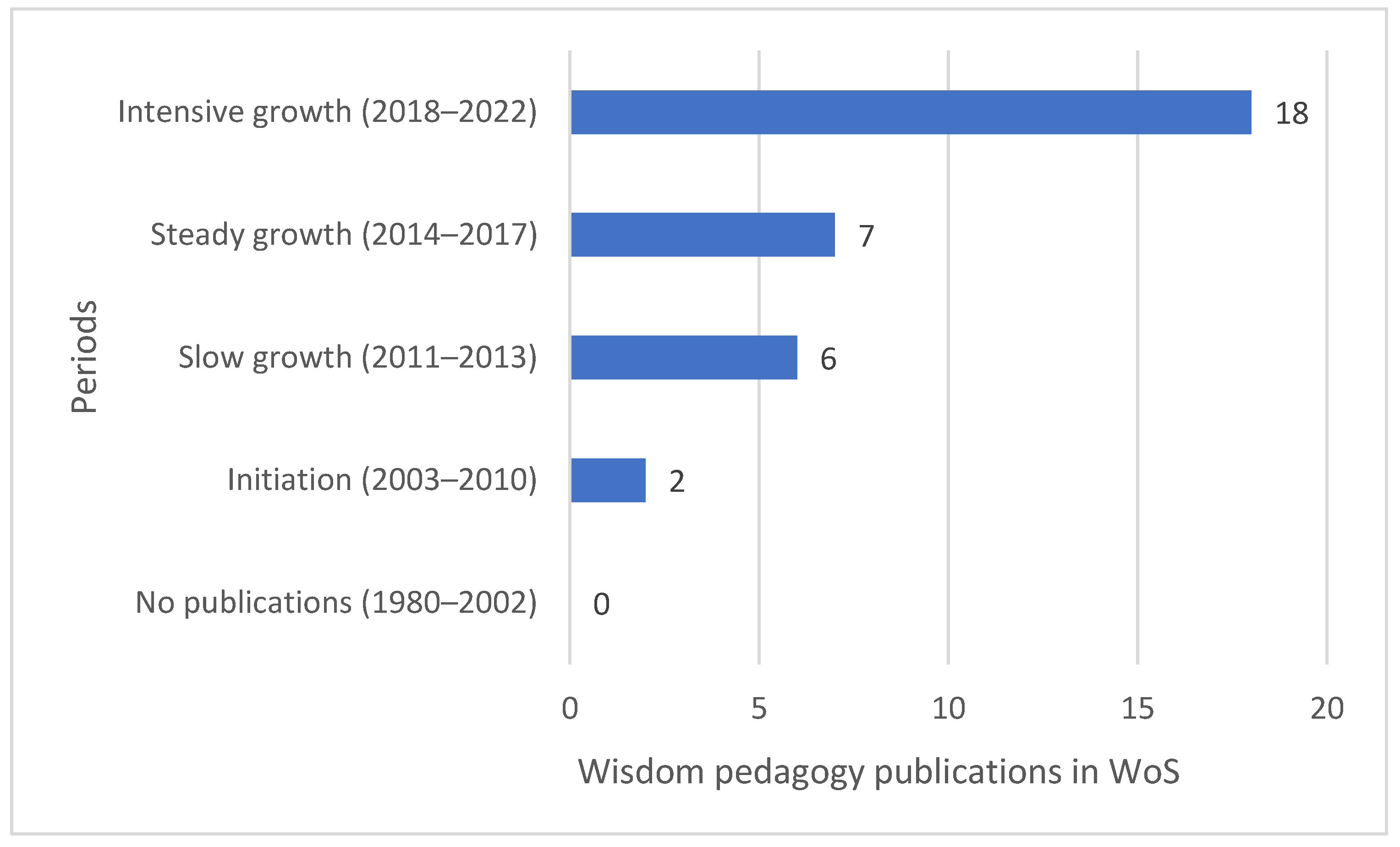

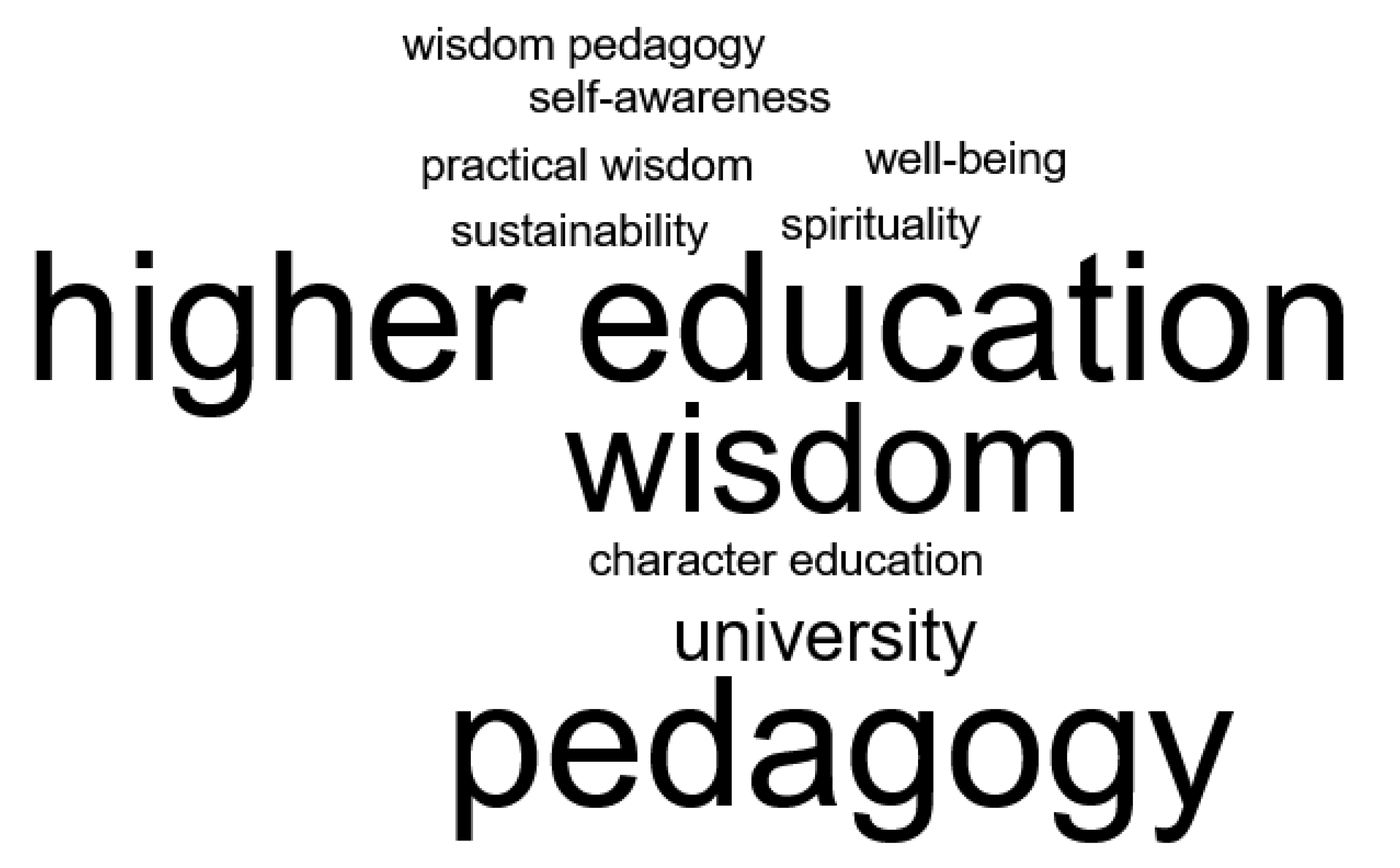
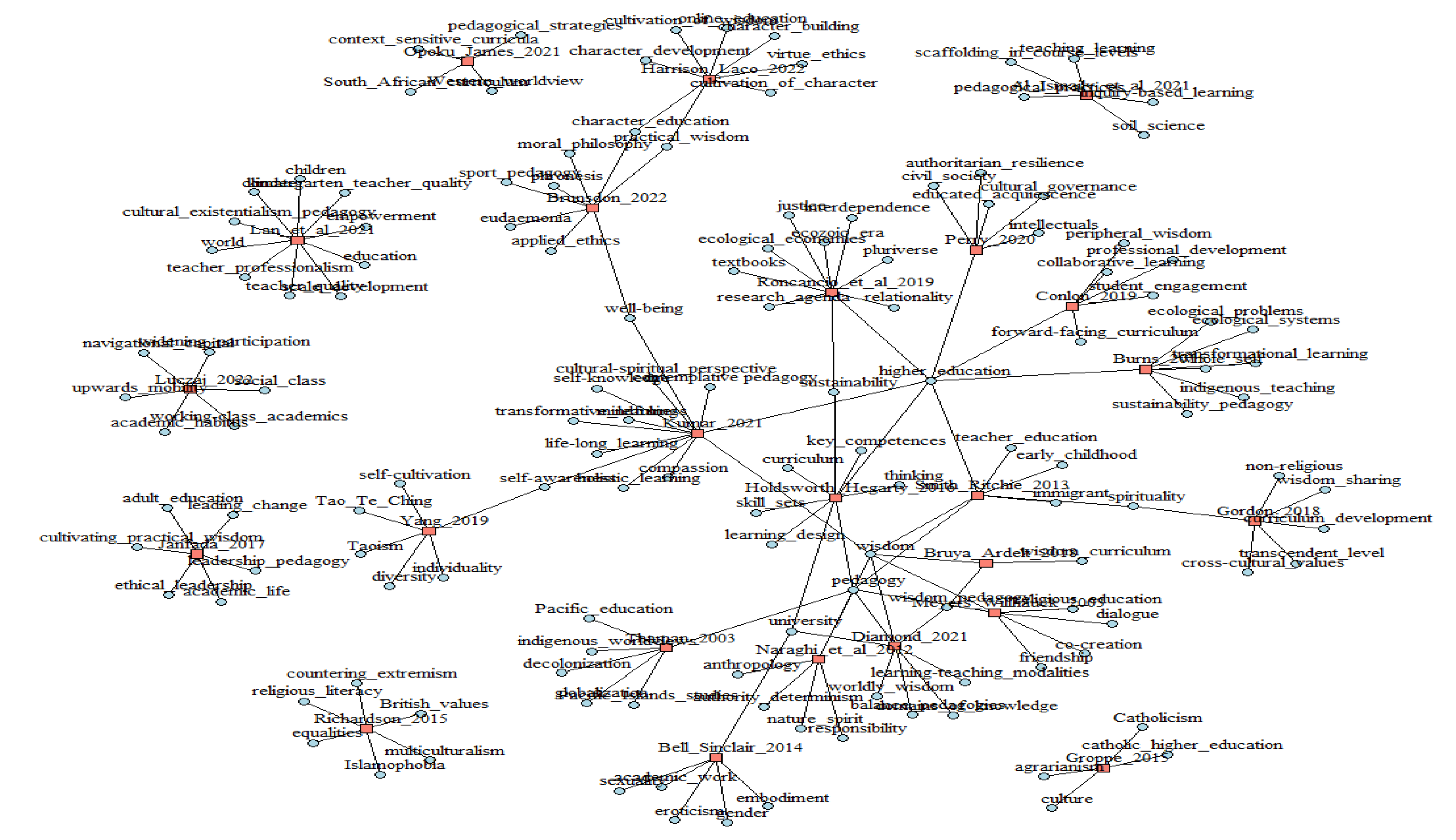
Disclaimer/Publisher’s Note: The statements, opinions and data contained in all publications are solely those of the individual author(s) and contributor(s) and not of MDPI and/or the editor(s). MDPI and/or the editor(s) disclaim responsibility for any injury to people or property resulting from any ideas, methods, instructions or products referred to in the content. |
© 2024 by the author. Licensee MDPI, Basel, Switzerland. This article is an open access article distributed under the terms and conditions of the Creative Commons Attribution (CC BY) license (https://creativecommons.org/licenses/by/4.0/).
Share and Cite
Jakubik, M. Rise of Wisdom Pedagogy Research in Higher Education (1980–2022): A Systematic Literature Review. Trends High. Educ. 2024, 3, 199-220. https://doi.org/10.3390/higheredu3020012
Jakubik M. Rise of Wisdom Pedagogy Research in Higher Education (1980–2022): A Systematic Literature Review. Trends in Higher Education. 2024; 3(2):199-220. https://doi.org/10.3390/higheredu3020012
Chicago/Turabian StyleJakubik, Maria. 2024. "Rise of Wisdom Pedagogy Research in Higher Education (1980–2022): A Systematic Literature Review" Trends in Higher Education 3, no. 2: 199-220. https://doi.org/10.3390/higheredu3020012
APA StyleJakubik, M. (2024). Rise of Wisdom Pedagogy Research in Higher Education (1980–2022): A Systematic Literature Review. Trends in Higher Education, 3(2), 199-220. https://doi.org/10.3390/higheredu3020012






